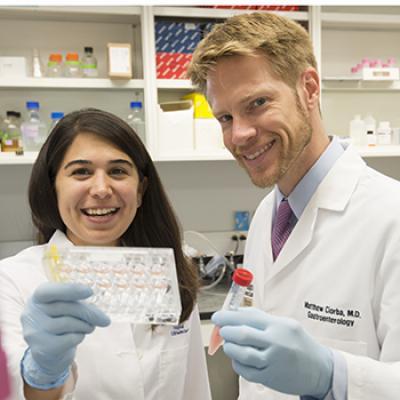The researchers developed an experimental system that created high levels of critical factors to isolate and expand intestinal epithelial stem cells, including a signaling protein called Wnt and a related protein called R-spondin, which enhances the Wnt signal. They also exposed the cells to a protein called Noggin, which prevented the cells from differentiating into other cell types that live in the GI tract.
After growing the intestinal cell lines, the investigators collaborated with Phillip I. Tarr, MD, the Melvin E. Carnahan Professor of Pediatrics and director of the Division of Pediatric Gastroenterology and Nutrition, to conduct experiments and see how the cells interacted with bacterial pathogens like E. coli.
This showed that pathogenic strains of E. coli attached to intestinal epithelial cells. That attachment is thought to be the critical step in stimulating disease. The investigators said the experimental system they created should lead to new methods to uncover therapies for treating bacterial infections of the intestine.
"In the past, the only really robust method for studying GI epithelial cells was to use cancer cell lines," said co-senior investigator Matthew A. Ciorba, MD, a gastroenterologist and assistant professor of medicine. "However, cancer cells behave differently than the noncancerous GI epithelium, which is affected in patients with conditions such as inflammatory bowel disease. This technique now allows us to study cells identical to the ones that live in a patient's GI tract. Plus, we can grow the cell lines quickly enough that it should be possible to develop a personalized approach to understanding a patient's disease and to tailor treatment based on a patient's underlying problem."
The researchers said the new technique is relatively simple and inexpensive and could easily be adapted for use in other laboratories.
"You can grow these cells, differentiate them and then test various therapies using these cells," Stappenbeck explained. "If we want to learn whether particular patients have a susceptibility to certain types of infections, we can test that. We're very excited about this going forward because we're entering new territory. We've never been able to do this before."

This image depicts Thaddeus S. Stappenbeck, MD, PhD.
(Photo Credit: Washington University School of Medicine)
Looking ahead, the researchers believe these cell lines will be useful in testing for new drug targets, for vaccine development and to better understand how these human cells interact with the beneficial and the harmful microbes that also live in the gut.

Kelli L. VanDussen, PhD, and Matthew A. Ciorba, MD are part of a team that has developed a method of growing human cells from tissue removed from a patient's GI tract. The method may help scientists develop tailor-made therapies for inflammatory bowel disease and other intestinal problems.
(Photo Credit: Robert Boston)